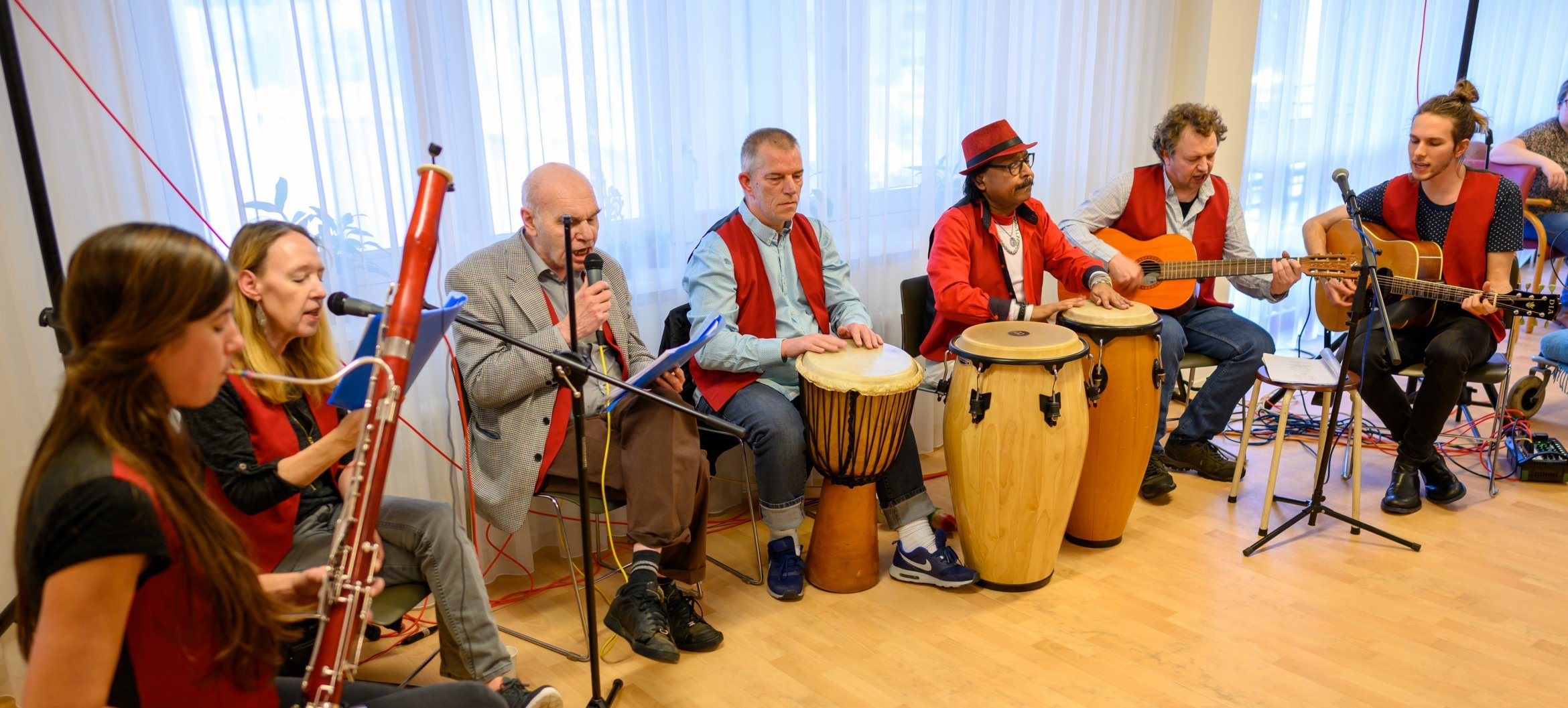Music lets Korsakoff patients briefly be the old rockers they once were
- Music
A new partnership between ArtEZ and Domus Nostra in The Hague enables Music Therapy master's students to study the effects of music therapy on Korsakoff patients. Monique van Bruggen-Rufi from ArtEZ and Farid Benkmil from Domus Nostra talk about Korsakoff, the therapy, writing songs and amazement.

"Students can enter a real world environment," says researcher and music therapist Monique van Bruggen-Rufi about Domus Nostra in The Hague. There are 84 Korsakoff patients in this small nursing home. From next academic year, master students in Music therapy will be studying the effects of music therapy on these patients. "This is a very interesting target group. It's a very varied group of people, who all have special stories to tell. It's painful and wonderful to discover the person behind the syndrome."
Music as a means to tap into emotion
Monique is the key figure in the new partnership between ArtEZ and Domus Nostra (part of the care organisation Saffier). She has worked for both for some time and sees great potential in the partnership. "We find that music therapy works very well with Korsakoff patients. Music is obviously a great way to tap into emotion and encourages social interaction. Furthermore, the neurological effect of music is a specialism in the ArtEZ course, and Korsakoff is a syndrome in which brain damage is a prominent feature."
Memory loss and psychological suffering
Korsakoff syndrome is most often related to alcohol, but what is it exactly? "In Korsakoff patients, their brain damage is caused by a deficiency of vitamin B1," explains Farid Benkmil, who works as a music therapist at Domus Nostra. "That deficiency is caused by a poor diet. Alcoholics drink a lot but don't eat very much. That combination causes brain damage, leading to memory loss."
These people can suffer from a range of problems, says Monique. "Often there is a lot of psychological pain behind their issues, such as depression, neglect and loneliness. There's a reason why they started drinking."
Unfortunately, there is no cure for Korsakoff patients. However, stopping drinking prevents their condition from getting worse. "That's the difference with dementia," says Farid. "There is also a learning ability. They can learn new skills, as well as pick up old ones again, like making coffee and doing the laundry."
‘The result is in the small things’
Music therapy improves their self-sufficiency and boosts their positive self-image, they find. "I'm the band leader of the Domus house band, which consists of five residents," says Farid. "These people play the music of their youth. In this way, you revisit good memories from the past. I also help them write songs. In that way, I encourage them to embark on a personal dialogue."
“Through the music, they can briefly be the old rockers they once were," says Monique. "We can't repair their brain damage, but we can improve the quality of their lives”
““The result is in the small things," Farid adds. "You see people over a fairly long period of time, and then small changes are very valuable.”
‘It starts with amazement’
More research can help develop music therapy for Korsakoff patients, they are convinced. Monique: "It starts with amazement. As a researcher, you look for what is right for someone. What does someone respond to? Maybe a rhythm? How does that affect them? The best studies are inspired by practice.”
Farid says that Domus Nostra has good possibilities to facilitate research. “You're not alone on the frontline.”
“We are an expertise centre,” adds Monique. “That is reflected by the Topcare designation too, which we were awarded in autumn 2021. Just like a restaurant can earn a Michelin star, we have this designation.”
Interested?
Are you, as a (current or prospective) master's student in Music Therapy, interested in doing research at Domus Nostra yourself? Then please contact Monique van Bruggen-Rufi. You can find more information about Korsakoff and music therapy in this article for the Tijdschrift voor Vaktherapie and this article for the journal Addiction Research.


